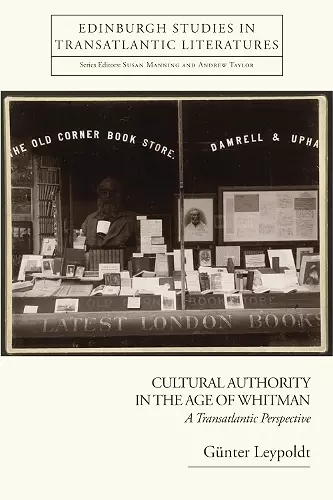Cultural Authority in the Age of Whitman
A Transatlantic Perspective
Format:Hardback
Publisher:Edinburgh University Press
Published:16th Sep '09
Currently unavailable, and unfortunately no date known when it will be back

Cultural Authority in the Age of Whitman deals with narratives of cultural legitimation in nineteenth-century US literature, in a transatlantic context. Exploring how literary professionalism shapes romantic and modern cultural space, Leypoldt traces the nineteenth-century fusion of poetic radicalism with cultural nationalism from its beginnings in transatlantic early romanticism, to the poetry and poetics of Walt Whitman, and Whitman's modernist reinvention as an icon of a native avant-garde. Whitman made cultural nationalism compatible with the rhetorical needs of professional authorship by trying to hold national authenticity and literary authority in a single poetic vision. Yet the notion that his 'language experiment' transformed essential democratic experience into a genuine American aesthetics also owes much to Whitman's retrospective canonization. What Leypoldt calls Whitmanian authority is thus a transatlantic and transhistorical discursive construct that can be approached from four angles: this book begins with an overview of transatlantic contexts such as the 19th-century literary field (Bourdieu) and the romantic turn to expressivism (Taylor); a detailed analysis of how Whitman's positions develop from the intellectual habitus and cultural criticism of Ralph Waldo Emerson follows, and in a third section Whitmanian authority is located within three conceptual fields that function as contact zones for European and American theories of culture: romantic notions of national style as a kind of music; place-centered concepts of national aesthetics; and traditional ideas about the aesthetic effects of democratic institutions. The final section, on Whitman's reinvention between the 1870s and the 1940s, discusses how the heterogeneous nineteenth-century perceptions of Whitman's work were streamlined into a modernist version of Whitman's nationalist program.
... a thoroughly engaging, intelligent, eloquent book. -- Daniel Goske * ZAA - Zeitschrift fuer Anglistik und Amerikanistik *
Impeccably edited, amply annotated and indexed, this book provides rich food for thought. -- Daniel Goske * ZAA - Zeitschrift fuer Anglistik und Amerikanistik *
This impressive study in cultural politics clarifies two puzzles: why did Whitman believe that there was a tight connection between free citizens and the "lawless music" of free verse? and why has anyone else ever believed it? With real erudition, Leypoldt spans a history from the Enlightenment to Modernism, while maintaining his focus on Whitman. Rich resources from British, German, French, and American intellectual history are marshaled by a strong sociological thesis. -- Jonathan Arac, Mellon Professor of English, University of Pittsburgh.
Günter Leypoldt's impressive new book represents a sophisticated theoretical attempt to historicize the transnational by showing how Whitman conceived of his cultural authority as involving a deliberate attempt to create parallels and analogies among different aspects of U.S. culture. By contrasting this synthetic version of romantic nationalism with more heterogeneous versions of nineteenth-century aesthetics, including a fascinating chapter on Whitman's own involvement with the language of classical music, Lepoldt extends both the chronological and philosophical boundaries of critical discussions about the transnational turn. -- Paul Giles, Professor of American Literature, University of Oxford
ISBN: 9780748635740
Dimensions: unknown
Weight: 606g
312 pages